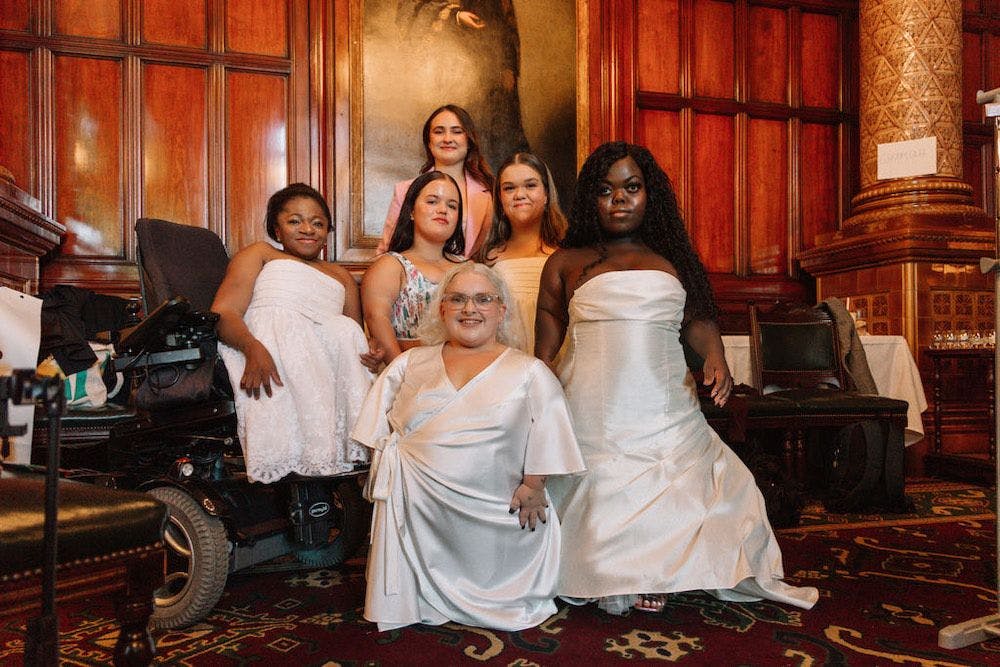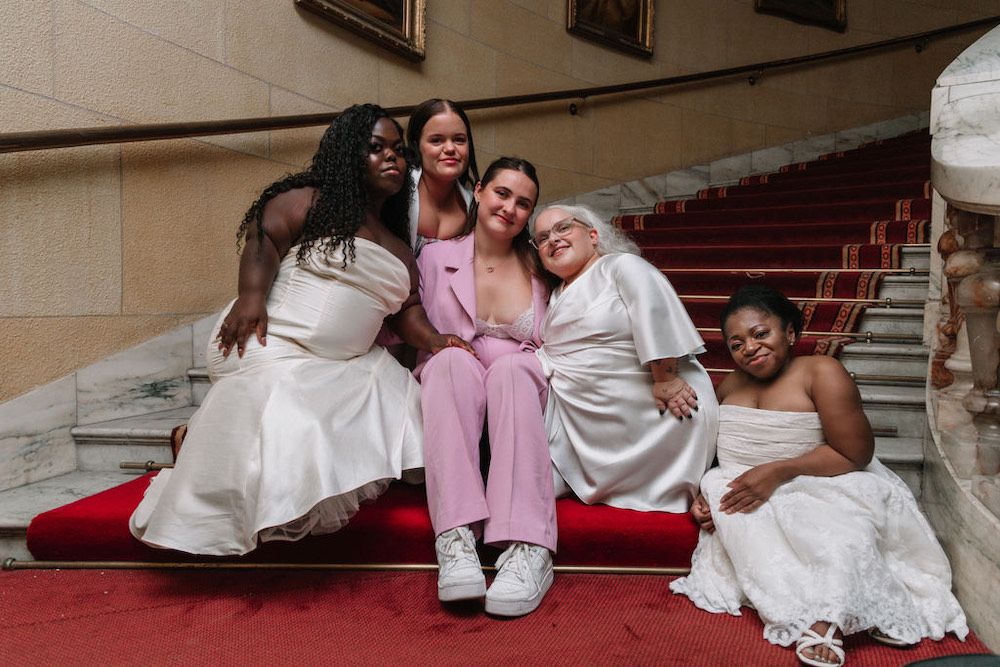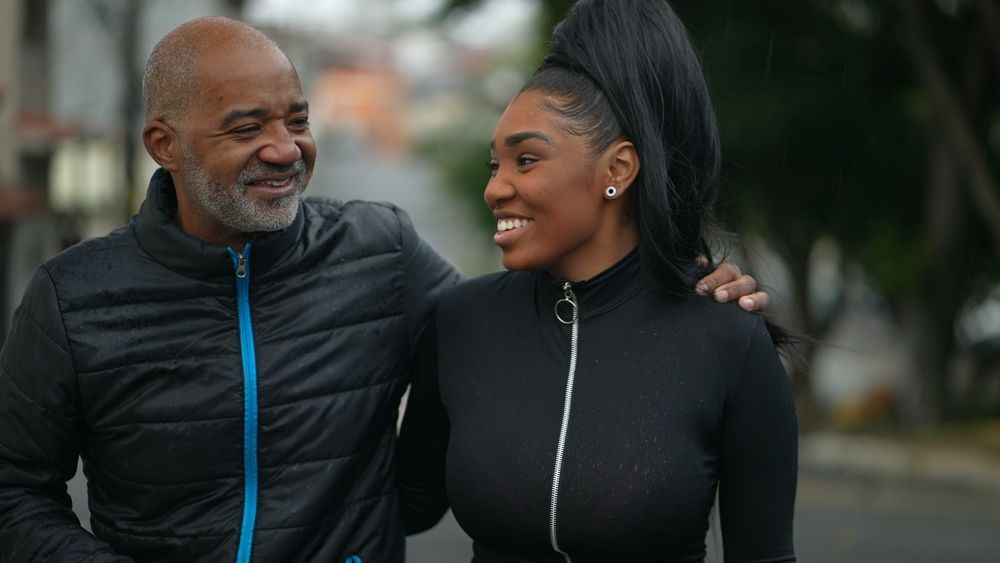
It's easy to let bad news overwhelm us, so break the cycle with these uplifting news stories from the past month
1. UK’s first brand for people under 4’10” hits the runway
It all started when Chamiah Dewey was a team leader on the National Citizen Service programme, in the summer of 2018. One of the young people in her group had achondroplasia, the most common form of dwarfism. Chamiah saw the challenges the young person had navigating a world not built for people like them, so when she went on to study at the London College of Fashion, she began to research what kind of clothes were available for those under 4’10”, and found a dire selection.
“From the hundreds of people I have spoken to of short stature, and other disabilities, it is a common theme that they struggle with their self-esteem, because the clothing they have to wear isn’t accessible or designed for their body,” Chamiah told Happiful. “Not only do they have to deal with the fact that clothing isn’t adaptive, and often they have to have help getting dressed, clothing is also uncomfortable to wear and unflattering. They also don’t feel seen and heard by the fashion industry. We’ve gained some inclusivity, yet we’ve still forgotten about the 2.3% of people who are short stature.”
And so Chamiah Dewey Fashion was born – a brand that creates timeless, elegant clothing for those under 4’10”. And the range is already making waves.
“As we become more well-known, feedback stays just as positive,” Chamiah said. “We’re really excited to make a difference, because there are 200 million people worldwide waiting for clothing designed for their bodies.”

Photography | Tom Buller
2. From 2025, all new buildings and homes in Tokyo will be required to have solar panels.
3. Retired police dog, Logan, who survived being shot three times, is being honoured with a lifetime achievement award.
4. Festive favourite Quality Street has made a move to become more eco-friendly, by swapping its famous, vibrant plastic wrappers for a recyclable wax paper, to help to reduce the 2 billion sweet wrappers going to landfill each year.
5. Three in four dads feel it’s their responsibility to know about menstrual cycles
The teenage years can be a challenging time – for teens and their parents. Knowing when, and in how much detail, to talk about topics such as puberty and menstruation can leave many parents feeling out of their depth and, for some dads, make them feel the need to turn to others for help. However, according to new data from intimate wellbeing brand Intimina, despite their discomfort, dads are stepping up and taking responsibility for helping their daughters.
It reported that 76% of UK dads feel it’s their responsibility to know about the menstrual cycle to help their children, and 78% have spoken with their daughter about menstruation at least once, while one in five speaks about it frequently. Plus, more than three-quarters (76%) have bought period products for their teens.
Broaching the subject of menstruation can feel uncomfortable, but it doesn’t have to be. By opening up and showing it’s a conversation teens can have with any parental figure or carer, it can help teens feel more comfortable asking questions and learning about their bodies. It’s time to bridge the gap and take responsibility for supporting our daughters, no matter what the topic.

6. Have you ever met someone and it just... clicked? There are people who seem to have been destined to be in your life, but scientists now say that the ‘ultimate formula’ for creating a friendship that lasts is spending 34 hours of quality time together. Why not schedule in some social time with a budding friend soon?
7. When retired Scottish nurse, Joy Milne, smelt a distinct change in her husband’s odour, 12 years before he was diagnosed with Parkinson’s, she never would have guessed that scientists could use her uncanny skill to develop a swab to detect the disease – with an astonishing 95% accuracy so far.
8. Beauty brands: it’s time to axe the anti-ageing rhetoric
Smile lines and crow’s feet can tell a story of a life well-lived, yet some beauty brands remain determined to ‘reduce’, ‘refine’, and ‘renew’ them. A recent study by data analysts at Lifestyle Packaging looked at 41 beauty brands, to see how often anti-ageing language was used to sell products, and found the phrase “anti-ageing” appeared nearly 3,000 times across 730 pages.
There were also mentions of ‘youth’, ‘young’, and ‘youthful’ a staggering 2,700 times. Language like this matters, and according to gerontologists, it plays a significant role in how we feel about ourselves.
“Anti-age messaging is so embedded in our everyday life that most of us don’t even recognise it. And when it comes to beauty products, it’s pervasive,” says Rich Quelch, global head of marketing at Lifestyle Packaging. “However, it’s encouraging to see some brands blazing the trail with minimal use of anti-age language, while promoting their products to a mature audience.”
Campaigns such as Age Without Apology are paving the way, and some brands are stepping up – those with the lowest use of anti-ageing language include Soap & Glory, Liz Earle, Elemis, and The Ordinary.
Ageing is a privilege, and it’s time for us to embrace it.
Feeling overwhelmed? Connect with a counsellor using the Counselling Directory

